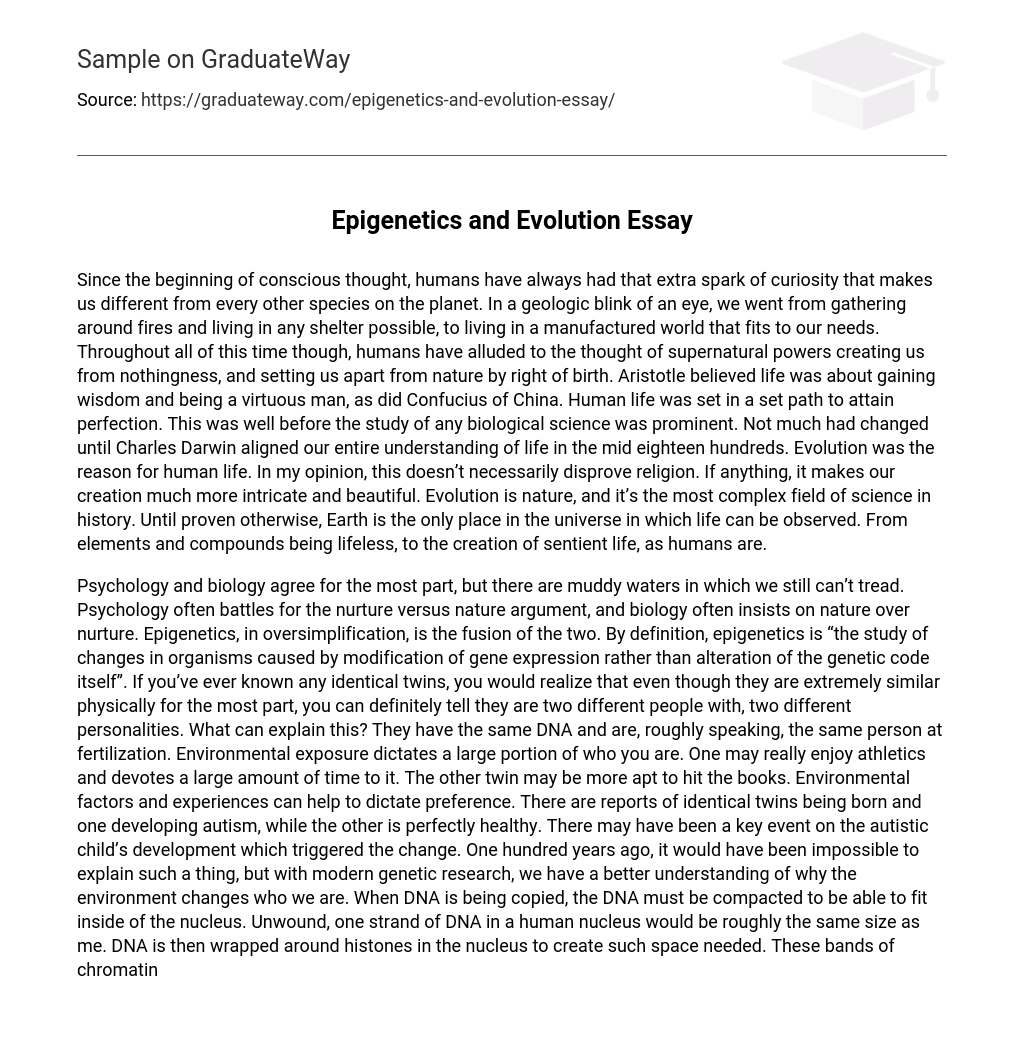Since the beginning of conscious thought, humans have always had that extra spark of curiosity that makes us different from every other species on the planet. In a geologic blink of an eye, we went from gathering around fires and living in any shelter possible, to living in a manufactured world that fits to our needs. Throughout all of this time though, humans have alluded to the thought of supernatural powers creating us from nothingness, and setting us apart from nature by right of birth. Aristotle believed life was about gaining wisdom and being a virtuous man, as did Confucius of China. Human life was set in a set path to attain perfection. This was well before the study of any biological science was prominent. Not much had changed until Charles Darwin aligned our entire understanding of life in the mid eighteen hundreds. Evolution was the reason for human life. In my opinion, this doesn’t necessarily disprove religion. If anything, it makes our creation much more intricate and beautiful. Evolution is nature, and it’s the most complex field of science in history. Until proven otherwise, Earth is the only place in the universe in which life can be observed. From elements and compounds being lifeless, to the creation of sentient life, as humans are.
Psychology and biology agree for the most part, but there are muddy waters in which we still can’t tread. Psychology often battles for the nurture versus nature argument, and biology often insists on nature over nurture. Epigenetics, in oversimplification, is the fusion of the two. By definition, epigenetics is “the study of changes in organisms caused by modification of gene expression rather than alteration of the genetic code itself”. If you’ve ever known any identical twins, you would realize that even though they are extremely similar physically for the most part, you can definitely tell they are two different people with, two different personalities. What can explain this? They have the same DNA and are, roughly speaking, the same person at fertilization. Environmental exposure dictates a large portion of who you are. One may really enjoy athletics and devotes a large amount of time to it. The other twin may be more apt to hit the books. Environmental factors and experiences can help to dictate preference. There are reports of identical twins being born and one developing autism, while the other is perfectly healthy. There may have been a key event on the autistic child’s development which triggered the change. One hundred years ago, it would have been impossible to explain such a thing, but with modern genetic research, we have a better understanding of why the environment changes who we are. When DNA is being copied, the DNA must be compacted to be able to fit inside of the nucleus. Unwound, one strand of DNA in a human nucleus would be roughly the same size as me. DNA is then wrapped around histones in the nucleus to create such space needed. These bands of chromatin lining the histones possess epigenetic marks, which are like chemical tags that can help instruct how the genes are interpreted. Sometimes these tags can pull the chromatin tighter, compressing it against the histones. Once this happens, the information is no longer able to be read, making this coding useless. In contrast, the chromatin can also release its pressure, making it readable once again. This has a profound effect on our own development, and the overall evolution of life. It can be thought of, in a general sense, a pseudo-mutation. It’s not an actual mutation because it doesn’t alter our genetic coding. This is why a cell with the exact same DNA can be either a muscle cell, or a skin cell. These epigenetic marks turn on, and turn off specific coding’s, giving the cell an individual function.
Epigenetics really caught ground when an experiment on mice was conducted. Several generations of mice were bred, and something of great theory-challenging magnitude happened. One of the mice born had inherited a memory of a smell that its father had. Scientists saw this as a very Lamarckian occurrence, a parent passing traits acquired through life down onto their offspring. How did this mouse remember this smell, without ever smelling it? Would this be a case of an animal changing to adapt to its environment without natural selection? Darwinian evolution had already been very well established and observed, so this really threw geneticists a curveball. Of course, there had to be a scientific explanation. This is epigenetics at play. The mice were trained into fear of a smell. Every time they smelled this, they were given a mild shock to their feet. This rearranged the neurons in their brain to be more sensitive to the aroma. The following generations were afraid of the smell, without ever smelling it. To solidify the evidence even more, the mice’s brains were scanned and showed an increase of “M71 neurons” which contains a receptor to recognize the smell. At first they believed the fathers were treating the next generation a certain way to respond like this, but it was proved when their semen was transported to another lab, and the same phenomena occurred. This is solid evidence of the environment dictating behavior, even hereditarily. Another experiment of mice showed that a mother’s neglect during development made the offspring unable to handle stress as effectively as a normal mouse. Developmental stages are highly important and are studied by psychologists extensively to understand what causes predispositions. Nurture influences how nature presents itself.





